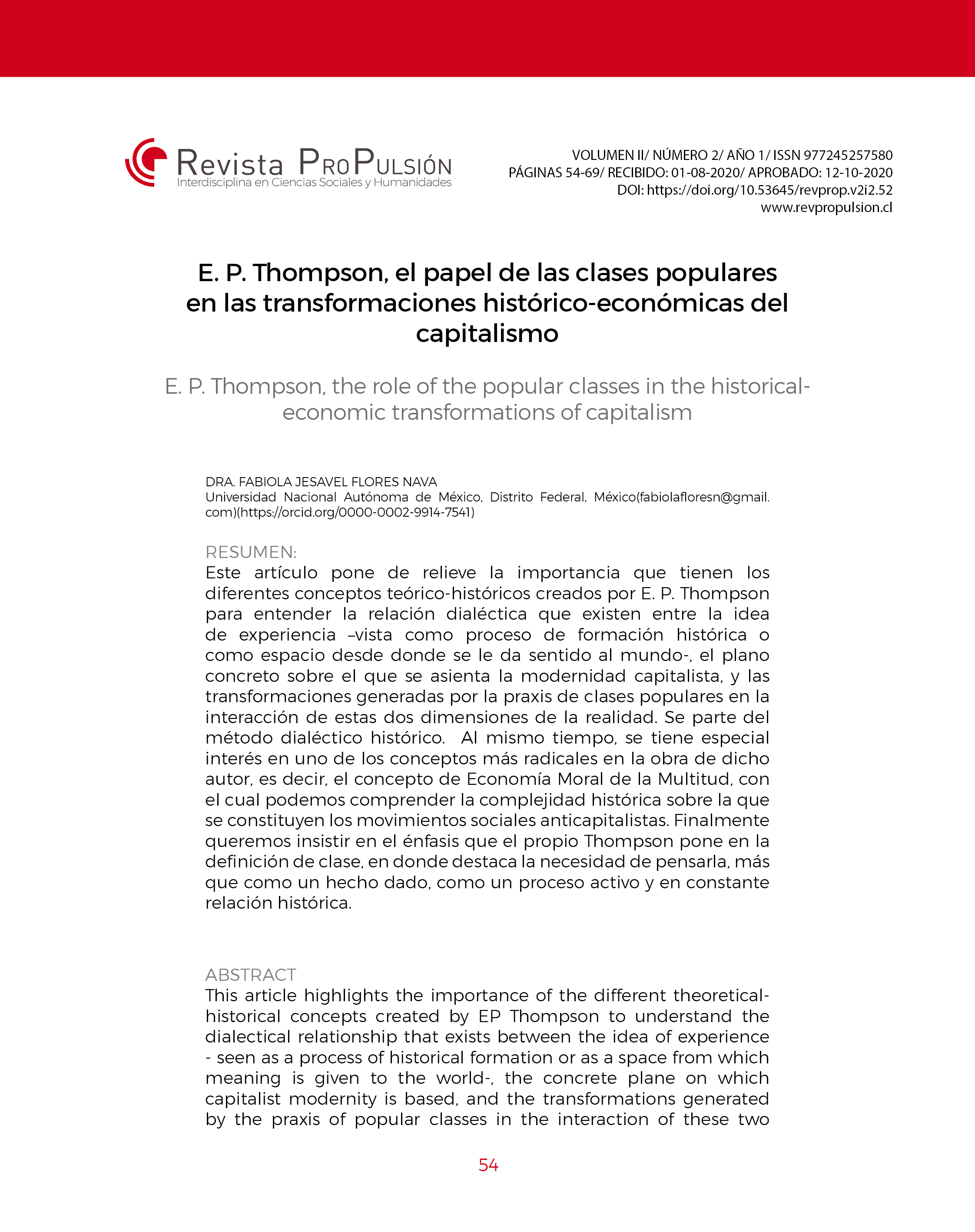E. P. THOMPSON, el papel de las clases populares en las transformaciones histórico-económicas del capitalismo
DOI:
https://doi.org/10.53645/revprop.v2i2.52Keywords:
experience, historical, agent, class, subaltern, groupsAbstract
This article highlights the importance of the different theoretical-historical concepts created by EP Thompson to understand the dialectical relationship that exists between the idea of experience - seen as a process of historical formation or as a space from which meaning is given to the world- , the concrete plane on which capitalist modernity is based, and the transformations generated by the praxis of popular classes in the interaction of these two dimensions of reality. At the same time, there is a special interest in one of the most radical concepts in the work of said author, that is, the concept of the Moral Economy of the Crowd, with which we can understand the historical complexity on which social movements are constituted anti-capitalists. Finally, we want to insist on the emphasis that Thompson himself places on the definition of class, where he highlights the need to think about it, rather than as a given fact, as an active process and in constant historical relationship.
Downloads
References
Aguirre Rojas, C. A. (2016). La Economía Moral de la Multitud pensada desde América Latina
en E. P. Thompson, La economía moral de la multitud y otros ensayos. Ediciones desde abajo.
Anderson, P. (1985). Teoría, política e historia. Un debate con E.P. Thompson. Siglo XXI.
Eley, G. (1994). E. P. Thompson, Historia Social y Cultura Política: La formación de la clase
obrera, 1780-1850, en Historia Social N° 18.
Fontana, J. (1994). E. P. Thompson, hoy y mañana, en Historia Social, N° 18.
Giddens, A. (1994). Fuera del Mecanismo: E. P. Thompson sobre conciencia e historia en Historia social, N° 18.
Herrera de la Fuente, C. (2007). Técnica en Marx y Heidegger. Dos versiones críticas de la
modernidad, Tesis de maestría en Filosofía. UNAM/FFyL.
Hobsbawm E. y Rudé, G. (1978). Revolución industrial y revuelta agraria. El capitán Swing.
Siglo XXI.
Hobsbawm E. y Rudé, G.. (1974). Rebeldes primitivos: estudio sobre las formas arcaicas de los movimientos
sociales en los siglos XIX y XX. Ariel.
Hobsbawm E. y Rudé, G.. (1984), De la historia social a la historia de la sociedad en Problemas de la historiografía
contemporánea, Universidad Autónoma del Estado de México.
Illades, C. (2001), Estudio sobre el artesanado urbano del siglo XXI. Fondo de Cultura
Económica.
Kaye, H. (1989). Los historiadores marxistas británicos, un análisis introductorio. Universidad
de Zaragoza.
Lucena Ayala, V. (2001). Entre el motín y el delito la protesta no institucionalizada en la provincia de Zaragoza. 1890-1905 en Historia Contemporánea, II (23).
Meiksins Wood, E. (1983). El concepto de clase en E. P. Thompson en Cuadernos políticos,
N° 36.
______. (1994). Entre las fisuras teóricas: E. P. Thompson y el debate sobre la base y la
superestructura, en Historia Social N° 18.
Rudé, G. (1981). Revuelta popular y conciencia de clase. Crítica Grijalbo.
Rudé, G. (1989). La multitud en la historia. Los disturbios populares en Francia e Inglaterra
(1730-1848). Siglo XXI.
Ridé, G. (2000). El rostro de la multitud. Biblioteca de Historia Social.
Samuel, R. (1991), Qué es la historia social, en Historia social, N° 10.
Scott, J. (2000). Los dominados y el arte de la resistencia. Discursos ocultos. Era.
Thompson, E. P. (1979). Tradición revuelta y conciencia de clase. Estudios sobre la crisis de la
sociedad preindustrial, Editorial Crítica.
Thompson, E. P. (1981). Miseria de la teoría. Editorial Crítica.
Thompson, E. P. (1989). La formación de la clase obrera en Inglaterra. Editorial Crítica.
Thompson, E. P. (1991). “Algunas observaciones sobre clase y «falsa conciencia»”en Historia Social,
N° 10.
Thompson, E. P. (1995). Costumbres en Común. Editorial Crítica/Historia del mundo moderno.
Tilly, C. (1986). The Contentious French. Harvard University Prees.
Thompson, E. P. (1996). Conclusion: Contention and the Urban Poor in Eighteenth-and Nineteenth-
Century Latin America en Arrom, S. y Ortoll, S. (eds.) Riots in the Cities. Popular Politic in
the Urban Poor in Latin America, 1765-1910. Scholary Resources Books.
Tilly, L. y Tilly C. (1981). Class Conflict and Collective Action, Sage. New Approaches to Social Science History.
Zemon Davis, N. (1991). Las formas de la historia social en Historia Social, N° 10.

Published
Versions
- 2021-01-15 (2)
- 2021-01-15 (1)
How to Cite
Issue
Section
Categories
License
Copyright (c) 2021 Fabiola Jesavel Flores Nava

This work is licensed under a Creative Commons Attribution-NonCommercial 4.0 International License.
- Esta licencia permite a los reutilizadores distribuir, remezclar, adaptar y construir sobre el material en cualquier medio o formato solo con fines no comerciales, y solo mientras se dé atribución al creador.Incluye los siguientes elementos: POR – Se debe dar crédito al creador NC – Solo se permiten usos no comerciales de la obra.







